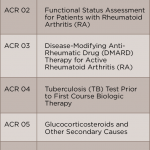In the first scene of the Broadway stage adaptation of Harper Lee’s To Kill a Mockingbird, young Scout contemplates two words she has heard in the courtroom: “All rise,” and wonders if they really are meant to elevate the minds of all those present for the proceedings. That instruction—“All rise”—serves as a leitmotif throughout the play, a reminder of something higher or greater that can be achieved if we put forth our best efforts.
At the ACR, we are committed to providing to all rheumatology professionals what we need to excel in our specialty. Put another way, the ACR seeks to enable us all to heed the call to rise—quite literally, as it turns out. The Rheumatology Informatics System for Effectiveness registry, better known as RISE, is now the largest rheumatology registry in the world. It is a remarkable tool with vast potential to improve patient outcomes and advance clinical research through data collected on almost 2 million unique patients so far. With RISE, we can reach some of the highest goals we set for our specialty in the care of our patients with rheumatic disease.
Where We Are
The RISE registry was started in 2014 to help clinical rheumatology professionals navigate the ever-evolving federal reporting requirements for reimbursement and incentive payments. Cognizant of the burden these requirements for data collection place on busy practitioners, the ACR developed RISE to automatically extract patient data from the electronic health record (EHR) systems of participating providers, including some data captured in their notes, with no additional demand on their time to collect those data for reporting purposes. The extracted data are used to populate an analytics dashboard that displays each provider’s performance on a number of quality metrics.
Originally intended to help clinicians report to the Centers for Medicare & Medicaid Services (CMS) for the Physician Quality Reporting System (PQRS), RISE has since been adapted to serve rheumatology providers who need to report for CMS’ current Quality Payment Program via the Merit-Based Incentives Payment System (MIPS) pathway. Since its launch, RISE has enabled participating providers to successfully navigate and report in these incentive-based programs, as well as gain the rewards bestowed by these systems for high performance.
The RISE registry has also been an important tool for tracking the quality of care provided to rheumatology patients. With both rheumatology-specific and rheumatology-related general practice quality measures, providers using RISE can see how well they perform on dozens of metrics that indicate quality of care. Further, the data gathered through RISE is providing the rheumatology community with a new understanding of clinical practices, including treatment patterns and patient outcomes. However, the promise of the registry goes beyond payment reporting and tracking practice patterns.
With the strong foundation the RISE registry has established, we are poised to realize the full potential of RISE to add greater value to our specialty. But to best identify the areas of greatest impact to which we should direct our efforts for the next phase of RISE, we needed the input of our members and other stakeholders. To this end, the ACR convened the RISE Summit, which took place this past May in Washington, D.C.



